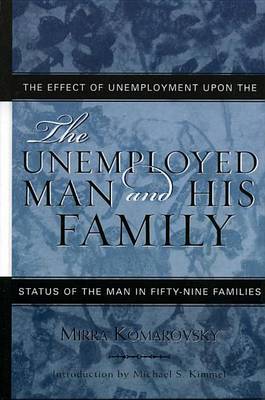Classics in Gender Studies
2 primary works • 4 total works
Book 8
In Women in College, feminist and sociologist Mirra Komarovsky interviewed women who entered Barnard College in the fall of 1979, finding that the demands of college life facilitated and occasionally forced many of these women to change their self-concept. Many felt trapped between new ideals of femininity - including action, vigor, rational competence, and effectiveness - and traditional notions of femininity, centered around emotional nurturance, passivity and kindness. This study forms the basis of her critique of the struggle that arose from the differences in what were seen as the mutually exclusive roles of homemaker and those who pursued work outside the home.
Book 9
In The Unemployed Man and His Family, noted sociologist and feminist Mirra Komarovsky poses the question: what happens to the authority of the male head of the family when he fails as a provider? Between 1935 and 1936, Komarovsky interviewed 59 families in 1935-36 in which the male had been unemployed for at least a year. Interestingly, in many cases, the husband's struggle in the economic sphere did not offset the solidity and happiness of the marital relationship. But unemployment seems to have affected the men's sense of their own position as head of household and providers. For one thing, it undermined their sense of themselves as breadwinners. Most found it unbearably humiliating to accept relief. Perhaps her most important finding-which still resonates today-was that those men who thought of themselves exclusively as providers suffered far more than those who had developed alternative identities as father and husband.
In Dilemmas of Masculinity, noted sociologist Mirra Komarovsky turns her attention to the consequences of feminism among women on the lives of men. As she'd documented in Women in the Modern World, and would again in Women in College, women's lives had changed enormously in the thirty-plus years Komarovsky taught at Barnard College. Women now are able to own their intelligence without apology, and most of the women had career aspirations that were equal to the men across the street at Columbia. In fieldwork conducted with Columbia College seniors in 1969-1970, she continually found that women's newly claimed freedoms, however, sat uneasily on men who had been raised in traditional homes. On the one hand, they respected women's intellectual achievements and even welcomed women's career aspirations. The campus ethos "demanded that men pay at least lip service to liberal attitudes towards working wives," Komarovsky wrote in an article based on the research. On the other hand, they didn't want to sacrifice any of the privileges they had been taught to expect - that their wives would do virtually all the child care and housework. As a result, the men were utterly unprepared for the new world of gender equality that women were beginning to demand.
In Women in the Modern World, noted feminist and sociologist Mirra Komarovsky begins with a consideration of biology. Reflecting on these now-familiar arguments that the natural biological differences between women and men dictate different social roles, Komarovsky demolishes these arguments by carefully reviewing studies that find sex differences in cognitive abilities, achievement, and psychological predispositions. In successive chapters, Komarovsky explores how differential socialization produces the differences that we think we observe between women and men, and how gender inequality disfigures the lives of women, men, and the relationships between them. One chapter examines how it plays out among college students at Barnard in the first college generation after the Second World War. Many of these bright and ambitious women feel trapped between their talents and the constraints of feminine domesticity mapped out for them by social expectations. Successive chapters examine the costs of choosing either alternative. Full-time homemakers feel, at best, overworked and undervalued, and at worst resentful and bitter. Many regret the 'painful reorganization of life,' and long, instead 'for the relinquished occupation.' It is this longing, she argues that leads so many women to 'flit from one evanescent interest to another, arriving at late or middle age without anything that would given meaning or continuity to their lives.'


